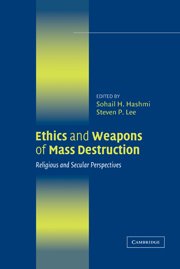Book contents
- Frontmatter
- Contents
- Tables and Figures
- Acknowledgments
- Abbreviations
- Ethics and Weapons of Mass Destruction
- Introduction
- 1 Weapons of Mass Destruction: A Brief Overview
- 2 The International Law Concerning Weapons of Mass Destruction
- PART ONE THE ORIGINAL DEBATE
- PART TWO EXPANDING THE CONVERSATION
- 11 Buddhist Perspectives on Weapons of Mass Destruction
- 12 Buddhism and Weapons of Mass Destruction: An Oxymoron?
- 13 Confucianism and Weapons of Mass Destruction
- 14 “Heaven's Mandate” and the Concept of War in Early Confucianism
- 15 Hinduism and the Ethics of Weapons of Mass Destruction
- 16 Hinduism and Weapons of Mass Destruction: Pacifist, Prudential, and Political
- 17 Islamic Ethics and Weapons of Mass Destruction: An Argument for Nonproliferation
- 18 “Do Not Violate the Limit”: Three Issues in Islamic Thinking on Weapons of Mass Destruction
- 19 Judaism, War, and Weapons of Mass Destruction
- 20 Between the Bible and the Holocaust: Three Sources for Jewish Perspectives on Mass Destruction
- PART THREE CRITICAL PERSPECTIVES
- Contributors
- Index
16 - Hinduism and Weapons of Mass Destruction: Pacifist, Prudential, and Political
Published online by Cambridge University Press: 05 June 2012
- Frontmatter
- Contents
- Tables and Figures
- Acknowledgments
- Abbreviations
- Ethics and Weapons of Mass Destruction
- Introduction
- 1 Weapons of Mass Destruction: A Brief Overview
- 2 The International Law Concerning Weapons of Mass Destruction
- PART ONE THE ORIGINAL DEBATE
- PART TWO EXPANDING THE CONVERSATION
- 11 Buddhist Perspectives on Weapons of Mass Destruction
- 12 Buddhism and Weapons of Mass Destruction: An Oxymoron?
- 13 Confucianism and Weapons of Mass Destruction
- 14 “Heaven's Mandate” and the Concept of War in Early Confucianism
- 15 Hinduism and the Ethics of Weapons of Mass Destruction
- 16 Hinduism and Weapons of Mass Destruction: Pacifist, Prudential, and Political
- 17 Islamic Ethics and Weapons of Mass Destruction: An Argument for Nonproliferation
- 18 “Do Not Violate the Limit”: Three Issues in Islamic Thinking on Weapons of Mass Destruction
- 19 Judaism, War, and Weapons of Mass Destruction
- 20 Between the Bible and the Holocaust: Three Sources for Jewish Perspectives on Mass Destruction
- PART THREE CRITICAL PERSPECTIVES
- Contributors
- Index
Summary
What kind of ethical stance do Hindus adopt toward weapons of mass destruction, especially nuclear weapons? Katherine Young's illuminating chapter suggests that, broadly speaking, Hinduism has two traditions of thought that speak to this question: a pacifist, Gandhian viewpoint that is repulsed by violence in virtually any form, including that perpetrated by nuclear weapons; and a more prudential, existential viewpoint that accepts the necessity of violence and nuclear weapons but seeks to constrain both. Young bases her analysis largely on classical Hindu texts as well as on the statements of Mahatma Gandhi and contemporary Indian officials and analysts.
Is there anything that one could add to her fine, path-breaking analysis? The sources of Hindu thought and practice are many, and Young would admit that there are other classical texts from which one could extrapolate Hindu stances toward nuclear weapons and organized violence. In this chapter, I argue that there is a third source of Hindu thinking on nuclear weapons, namely, contemporary political Hinduism, or Hindutva. I use “political Hinduism” or “Hindutva” to refer to the pronouncements and writings associated with the conglomerate of political groups known as the Sangh Parivar. Young gestures at some of its perceptions. This chapter attempts to describe the historiography within which political Hinduism thinks about nuclear weapons and to analyze an influential text of political Hinduism for what it says about international relations and the problem of war and peace.
- Type
- Chapter
- Information
- Ethics and Weapons of Mass DestructionReligious and Secular Perspectives, pp. 308 - 320Publisher: Cambridge University PressPrint publication year: 2004
- 3
- Cited by



